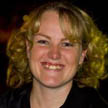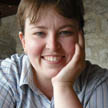I’m a Scientist is like school science lessons meet the X Factor! School students choose which scientist gets a prize of $1000 to communicate their work.
Scientists and students talk on this website. They both break down barriers, have fun and learn. But only the students get to vote.
This zone is the Disease Zone. It has scientists studying the causes and processes of illness . Who gets the prize? YOU decide!









Dear Boobsta; Your question is very difficult to answer bacause we can’t experience what happens after death, we can’t prove anything through ‘science’.
Your question belongs to an area of religion.
Personally I believe there is some kind of life after death, very different and a lot longer than what we are living now. Many people think of what is after death, and some explained with an analogy(example) like below.
A baby(fetus) in mother’s womb who lives for 9 months in water never know or understand what is going to happen after the birth. The fetus can’t do anything but to grow to full term. After birth, not by the choice of the fetus, the baby has different kind of life; breathing air and drinking milk, etc. The baby get to meet father and mother face to face. The fetus lived for 9 months in the womb, but may live 90 years outside.
Life and death are not our choice. However we can choose how to live everyday life; with gratitude doing good works and live best of ourselves or kill the time and live for pleasure and waste away the talents, thus be sorry when get old. What kind of life we live is our choice. That choice you make is very important for young people like you.
0
Soon is right that this is a question for religion and not science, because science relies on the ability to observe things in order to explain them, and we can’t observe the afterlife. Things like an afterlife are ‘supernatural’, meaning ‘above or beyond the natural’ and science deals with the natural, so we can’t say anything about the supernatural in our role as scientists.
With that said, you asked what I think not what I can prove. And my response is that I’m an athiest, because I don’t believe in a God or anything else supernatural and I see no evidence that they exist. I think that we can explain our existence entirely by the chemistry and physics of our bodies; the electrical signals in our brain, the chemistry of our body, the laws of physics. Thus, I believe that when we die, we cease to exist. The chemistry stops working and our body breaks down, and nothing else happens.
This isn’t a comfortable way to think, and it scares many people. Some choose to believe in an afterlife because of this fear, and I almost wish that I could be one of those people. It would definitely be easier if I believed in a God or an afterlife. But it’s not something that I can bring myself to do.
0
Tough question for a Monday morning to answer. I know everybody thinks different about it, but I’m convinced that there is a heaven and hell (sorry if I upset or offend anyone). I was brought up as a Christian and strongly believe in what the bible says is true! Even though it goes against science, I believe in it.
Just because science hasn’t been able to prove or disprove a heaven, doesn’t mean it doesn’t exist!
0
While I can’t speak on the topic of what happens after death from a religious point of view, I can certainly talk about it from a biological standpoint, because I studied to be a forensic biologist as an undergraduate.
Death occurs when your heart stops beating, your lungs stop taking in air, and your brain activity stops. Sometimes the brain still fires electrical pulses through nerves, causing twitches. As soon as the blood stops flowing, the body begins to cool, about 0.8C per hour until it reaches room temperature. Gravity causes blood to pool, causing bruise-like patches under the skin. Between 3-6 hours after death, the body begins to stiffen, called rigor mortis. Skin actually keeps growing for a day or two after death. After a few days, the bacteria that live in the gut while you’re alive begin to take over, as the body is no longer suppressing them. The bacteria and their enzymes begin to break down the body, making it decompose, changing colour, liquifying organs, and creating gases. After a few weeks, hair, teeth and nails fall out (they don’t actually keep growing after death, they just seem to grow as the rest of the body shrinks).
Of course, we don’t usually get to see all of this happen in humans. Because of law, and religion, we treat with the remains of the deceased quickly. The many ways we treat bodies after death, be it embalming, mummifying, freezing, cannibalising, cremating, or burying, all mean that this process is rarely observed in humans.
0
Tough question Boobsta – it can be approached from either a scientific or a religious standpoint. I’m going to attempt to come from both angles. I was raised a Christian and believe in heaven and hell so I believe that after you die your soul will go to one of those places (sorry if I offend anyone, but thats what I believe).
As for your body, well thats purely a matter for science. Its a matter of biology and chemistry that within a matter of hours of death the microorganisms that live in the gut begin the process of decomposition. It depends on the environment around how long this process can take – in fact a knowledge of the environment and the condition of human remains is one way that forensic investigators can estimate time of death (but not the only way)
0